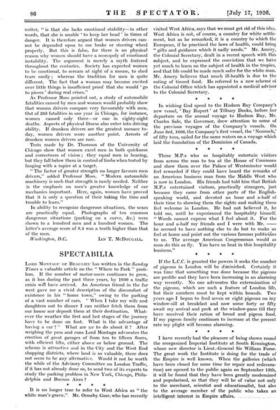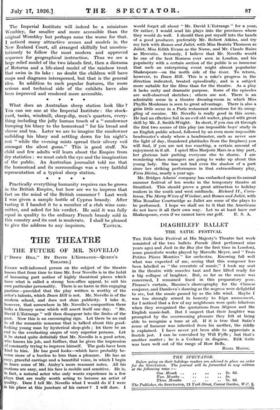SPECTABILIA
LORD MONTAGU OF BEAULIEU has written in the Sunday Tithes a valuable article on the " Where to Park " prob- lem. If the number of motor-users continues to grow, as it has during the past three years, by 1930 a traffic crisis will have arrived. An American friend in the far west gave me a vivid description of the discomfort of existence in his " home town," owing to the parking of a vast number of cars. " When I take my wife and daughters out to dinner I can neither fetch them from our house nor deposit them at their destination. What- ever the weather the first and last stages of the journey have to be done on foot. What is the advantage of having a car ? " What are we to do about it ? After weighing the pros and cons LOrd Montagu advocates the erection of great garages of from ten to fifteen floors, with efficient lifts, either above or below ground. The scheme is attractive and in the City and the West End shopping districts, where land is so valuable, there does not seem to be any alternative. Would it not be worth the while of the Advisory Committee on London Traffic, if it has not already done so, to send two of its experts to study the parking problem in New York, Chicago, Phila- delphia and Buenos Aires ? .
* - * It is no longer true to refer to West Africa as " the white man's-grave.". Mr. Ormsby_Gore;who has recently visited West Africa, says that we must get rid of this idea. West Africa is not, of courSe, a country for :white settle- ment, but as he remarked, it is a country to which the European, if he practiSed the laws of health, could bring " gifts and guidance which it sadly needs." Mr. Amer, the ColOnial Secretary; dealt in a recent speech with this subject, and he expressed the conviction that we haVe yet much to learn on the subject of health in the tropics, and that life could be made much safer for the white man. Mr. Amery belieVeS that much ill-health is due to the eating of tinned food; He-referred to a: new scheme of the Colonial Office which has appointed a medical adviser _ to the Colonial Secretary.
* * * * In wishing God speed to the Hudson Bay Company's new vessel, ' Bay Rupert ' at Tilbury Docks, before her departure on the annual voyage to Hudson Bay, Mr. Charles Sale, the Governor, drew attention to some of the previous voyages of the Company's vessels. On June 3rd, 1668, the Company's first vessel, the ' Nonsuch,' of fifty tons, sailed for the same waters on a voyage which laid the foundation of the Dominion of Canada.
* * Those M.P.s who so hospitably entertain visitors from across the seas to tea at the House of CoMmons and show them over the Palace of Westminster would feel rewarded if they could have heard the remarks of an American business man from the Middle West who is now in London. His friends had told him that British M.P.s entertained visitors, practically strangers, just because they came from other parts of the English- speaking world, and devoted an hour and a-half of their time to showing them the sights and making them feel welcome in London. He had not believed it, he told me, until he experienced the hospitality himself. " Words cannot express what I feel about it. For the hour and a-half my friends and I were with Mr. — he seemed to have nothing else to do but to make us feel at home and point out the various famous politicians to us. The average American Congressman would as soon do this as fly. You have us beat in this hospitality business."
If the L.C.C. is granted the powers it seeks the number of pigeons in London will be diminished. Certainly it was time that something was done because the pigebns are prolific and they have been increasing in an alarming way recently. No one advocates the extermination of the pigeons, which are such a feature of London life, but their numbers must be kept within boundS. Two years ago I began to feed seven or eight pigeons on my window-sill at breakfast and now some forty or fifty await my arrival and peck at the window-pane till they have received their ration of bread and pigeon food. If my pigeon family continues to increase at the present rate my plight will become alarming.
* * * * I have recently had the pleasure of being shown round the reorganized Imperial Institute at South Kensington, whose new director is Lieut.-General Sir William Furse. The great work the Institute is doing for the trade of the Empire is well known. When the galleries (which have been closed for some time for repair and redecora- tion) are opened to the public again on September 15th, it will be found that they have been greatly modernized and popularized, so that they will be of value not only to the merchant, scientist and educationalist, bUt also to the average member of the public who takes an intelligent- interest in Empire affairs. The Imperial Institute will indeed be a miniature Wembley, far smaller and more accessible than the original Wembley but perhaps none_ the worse for that. I noticed many attractive scenes and models in the New Zealand Court, all arranged skilfullY, but unosten- tatiously to follow the most modern and approved sequence for geographical instruction. Thus we see a large relief model of the two islands first, then a diorama of Rotorua and a life-sized model of the rainbow trout that swim in its lake : no doubt the children will have maps and diagrams interspersed, but that is the general idea. In addition to such popular features, the more serious and technical side of the exhibits have also been improved and rendered more accessible.
* * What does an Australian sheep station look like ? You can see one at the Imperial Institute: the stock- yard, tanks, windthill, sheep-dip, men's quarters, every- thing including the jolly human touch of a " sundowner humping his bluey to the homestead " for his bread and cheese and tea. Later we are to imagine the sundowner unfolding - his bluey - and settling down for his night's rest " while the evening mists spread their silvery veil amongst the silent gums." This is good stuff. No child and few adults will learn about the Empire from dry statistics : we must catch the eye and the imagination of the public. An Australian journalist told me that the homestead and its surroundings was a very faithful representation of a typical sheep station.
*
Practically everything humanity requires can be grown in the British Empire, but how are we to impress that fact on the mind of the British consumer ? Last week I was given a sample bottle of Cyprus brandy. After tasting it I handed it to a member of a club wine com- mittee, and asked for his verdict. He said it was fully equal in quality to the ordinary French brandy sold in this country and its cost is moderate. I shall be pleased to give the address to any inquirers. TANTUM.











































 Previous page
Previous page